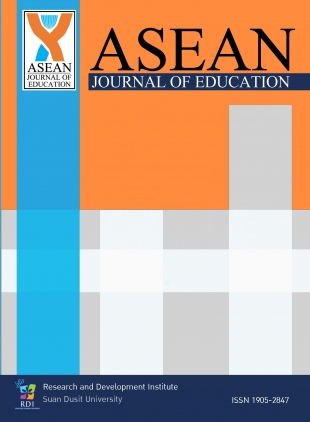Online Flipped Learning-Teaching in Action
Keywords:
Flipped classroom, Online learning, Online teaching, Online flipped classroomAbstract
The coronavirus crisis has caused the teaching style to shift from traditional teaching to online teaching, which has many obstacles and limitations. Most of the problems that occurred were the students' lack of concentration in studying, not attending classes, and no Q&A during online learning. Therefore, the integration of flipped classroom concept in online learning - teaching is believed to add to the value of online learning during times of disruption to traditional teaching. Learners will learn by themselves through video or other materials outside of the classroom and participate in co-learning activities in the normal classrooms. The roles of teachers and learners in the online flipped classroom must change. Teachers who maintain a course for this approach need to prepare materials, online tools and learning resources before teaching. In-class, they summarize the content, answer questions, and organize activities. After-class, they must check assignments and evaluate the results after practicing the activities. For learners, they must be active, responsible, and actively participate in discussions and activities during online learning hours. Importantly, they should prepare communication tools, read textbooks, and watch videos before coming to class. This approach reduced time spent studying theory and increased time spent doing activities. As a result, online learning is more efficient.
References
Abuhmaid, A., & Mohammad, A. (2020). The impact of flipped learning on Procrastination and students’ attitudes toward It. Universal Journal of Educational Research, 8(3), 566–573.
Akçayir, G., & Akçayir, M. (2018). The flipped classroom: A review of its advantages and challenges. Computers & Education, 126, 334–345.
Albrahim, F. A. (2020). Online Teaching Skills and Competencies. TOJET: The Turkish Online Journal of Educational Technology, 19(1), 9-20.
Bergmann, J., & Sams, A. (2012). Flip Your Classroom: Reach Every Student in Every Class Every Day. Washington, DC: Internal Society for Technology in Education.
Boonyok, W. (2018). The Development of Online Learning using Flipped Classroom to Enhance Learning Achievement on Presentation Using Computer Software (Master’s thesis). Bangkok: King Mongkut's Institute of Technology Ladkrabang.
Dhawan, S. (2020). Online Learning: A Panacea in the Time of COVID-19 Crisis. Journal of Educational Technology Systems, 49(1), 5-22
Karalis, T., & Raikou, N. (2020). Teaching at the times of COVID-19: Inferences and Implications for Higher Education Pedagogy. International Journal of Academic Research in Business and Social Sciences, 10(5), 479-493.
Kim, J. (2020). Learning and Teaching Online During Covid‑19: Experiences of Student Teachers in an Early Childhood Education Practicum. International Journal of Early Childhood, 52, 145–158.
McIntyre, S., & Mirriahi, N. (2022). Introduction to Online Learning. Retrieved June 7, 2022, Retrieved from https://sites.google.com/a/hawaii.edu/new-de-facultyorientation/Step-1
Nat, M. (2015). A Flipped Classroom Model for Developing Universities in Developing Countries. Global Learn 2015 - Berlin, Germany, April 16-17, 597-603.
Phonpakdee, R. (2020). Using Social Media in Teaching and Learning in COVID-19 Situation. Journal of Industrial Education, 19(1), 1-5.
Reidsema, C., Hadgraft, R., & Kavanagh, L. (2017). Introduction to the Flipped Classroom. In Reidsema, C., Kavanagh, L., Hadgraft, R., & Smith, N. (Eds.). The Flipped Classroom: Practice and Practices in Higher Education (3-14). Singapore: Springer Singapore.
Sadiku, M. N. O., Adebo, P. O., & Musa, S. M. (2018). Online Teaching and Learning. International Journals of Advanced Research in Computer Science and Software Engineering, 8(2), 73-75.
Saxena, K. (2020). Coronavirus accelerates pace of digital education in India. EDII Institutional Repository. Siritarungsri, B. (2020). The Management of Online Learning and Teaching:Towards the Professional Standards Framework for teaching and supporting learning in higher education. The Journal of Chulabhorn Royal Academy, 2(3), 1-17.
Suanse, K., & Yuenyong, C. (2019). Development of the Analytic Geometry Flipped Classroom Teaching Model Through Google Classroom. Journal of Physics: Conference Series, 1835, 1-14.
Tang, T., Abuhmaid, A. M., Olaimat, M., Oudat, D. M., Aldhaeebi, M., & Bamanger, E. (2020). Efficiency of flipped classroom with online-based teaching under covid-19. Interactive Learning Environments. Advance online publication. https://doi.org/10.1080/10494820.2020.1817761
Unal, Z., & Unal, A. (2017). Comparison of Student Performance, Student Perception, and Teacher Satisfaction with Traditional versus Flipped Classroom Models. International Journal of Instruction, 10(4), 145-164.
Viner, R. M., Russell, S. J., Croker, H., Packer, J., Ward, J., Stansfield, C., Mytton, O., Bonell, C., & Booy, R. (2020). School Closure and Management Practices During Coronavirus Outbreaks Including COVID-19: a Rapid Systematic Review. The Lancet Child and Adolescent Health, 4(5), 397-404.
Yang, L. (2020). Research on Flipped Classroom Online Teaching Under the Background of Epidemic Situation. International Journal of Education and Economics, 3(1), 44-50.
Zainuddin, Z., Zhang, Y., Li, X., Chu, S. K. W., Idris, S., & Keumala, C. M. (2019). Research trends in flipped classroom empirical evidence from 2017 to 2018: A content analysis. Interactive Technology and Smart Education, 16(3), 255–277.
Zhang, W., Wang, Y., Yang, L., & Wang, C. (2020). Suspending classes without stopping learning: China’s education emergency management policy in the COVID-19 outbreak. Journal of Risk and Financial Management, 13(3), 1-6.
Downloads
Published
How to Cite
Issue
Section
License

This work is licensed under a Creative Commons Attribution-NonCommercial-NoDerivatives 4.0 International License.
1 All articles will undergo a formal peer-review. A panel of experts from within or without the university will examine the article; approval from a minimum of two experts is required for publication. Revisions posed by the experts must be completed by the research prior to publication.
2 Once published in the ASEAN Journal of Education, the article becomes intellectual property of Suan Dusit University. Duplication, in full or part, requires permission from Suan Dusit University.
3 Excluding errors incurred during printing, author(s) are responsible for the content of their articles.






